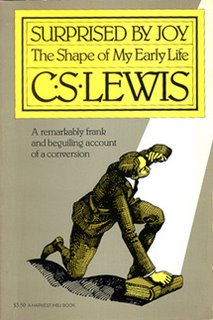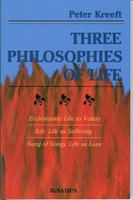Surprised by Joy
 There are many so called "arguments for the existence of God"; there are the cosmological, the teleological, the ontological, the axiological arguments, among others. Now, I do not think that we can prove the existence of God any more than I think we can prove the existence of man. Descartes missed one thing in his cogito. Namely, that he was assuming his existence (I) before he even began to think. One has to be a fool, or perhaps a philosopher, to deny one's existence. Similarly, "the fool has said in his heart there is no God."
There are many so called "arguments for the existence of God"; there are the cosmological, the teleological, the ontological, the axiological arguments, among others. Now, I do not think that we can prove the existence of God any more than I think we can prove the existence of man. Descartes missed one thing in his cogito. Namely, that he was assuming his existence (I) before he even began to think. One has to be a fool, or perhaps a philosopher, to deny one's existence. Similarly, "the fool has said in his heart there is no God."There are some things (which for C. S. Lewis was Joy), I think, which might lead us to God. I think this is how we should view the so called arguments for the existence of God. It is not that God exists once we have demonstrated His existence. God always exists. Rather, I think it might be that we "exist", at least a different kind of existence, once we have discovered God.
One such demonstration is C. S. Lewis' argument from Joy (found in Surprised by Joy, p.220...which I recently finished reading). Lewis begins with the premise that a desire is not turned to itself, but is turned to its object. In fact, "it owes all its character to its object." It is the object that either makes the desire desirable ("sweet" or "choice") or not desirable ("harsh" or "coarse"). My desire for my wife is not turned to the desire itself, but to my wife (and this is sweet not hash, choice not coarse!).
The second premise of Lewis' argument says that everyone has a desire for Joy. This is almost assumed for Lewis, and he likens his joy to the words "good" and "love." As we, naturally I suppose, desire good things, and most of all love, so too we have a desire for joy.
The problem for Lewis, being an atheist, at this point, was seeing what conclusion followed from these premises. He had a desire for something and therefore there must be some object to which his desire is turned. Lewis says, "I was wrong in supposing that I desired Joy itself. Joy itself, considered simply as an event in my own mind was of no value at all."
Naturally this begs the question, "To what was his joy turned?". Lewis says that the object of joy cannot be his own mind or body for he had tried that, and failed. Thus, "in a way" he had "proved this by elimination." What was it then? Lewis said that this Joy was proclaiming to him "You want--I myself am your want of--something other, outside, not you nor any state of you."
Lewis said that this gave him a sense of awe as he realized that "in deepest solitude there is a road right out of the self, a commerce with something which, by refusing to identify itself with any object of the senses, or anything whereof we may have biological or social need, or anything imagined, or any state of our own minds, proclaims itself sheerly objective. More objective than bodies for it is not, like them, clothed in our senses, the naked other, imageless (though our imagination salutes it with a hundred images), unknown, undefined, desired."
No wonder Lewis, a staunch atheist at this point, was surprised! Read more

